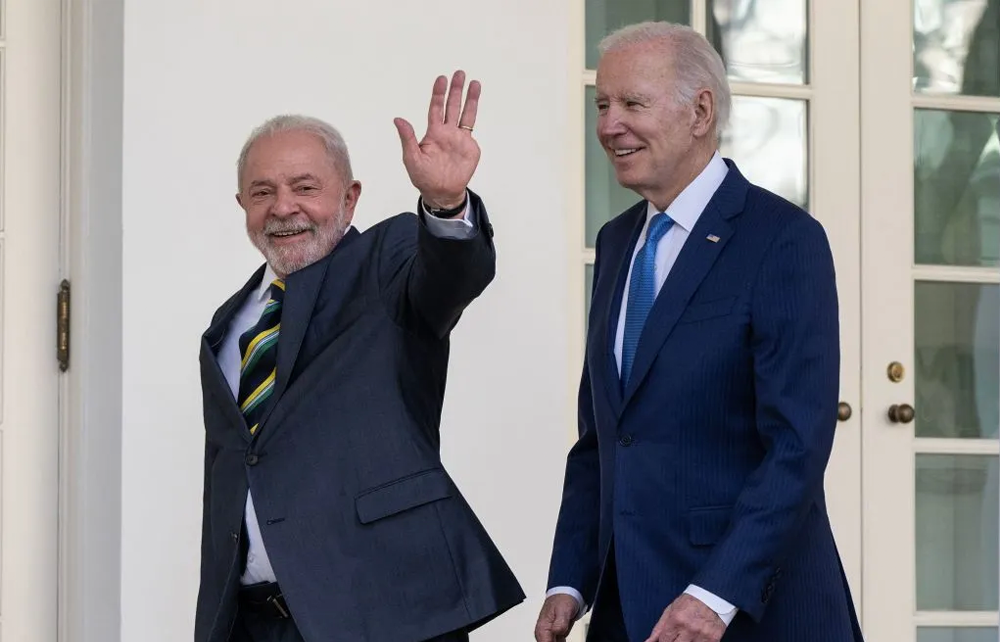Joe Biden has promised to bring Brazil and America closer together. “Both of our democracies have been tested of late,” Biden told reporters last week as he met with president Lula da Silva for the first time. The two leaders were on the “same page,” Biden said. But that feeling isn’t entirely mutual.
When Lula was sworn in as president on New Year’s Day, he promised “dialogue, multilateralism and multipolarity” — and there’s good reason to believe he’ll deliver it. In Lula’s first two terms, he was key to founding the BRICS, an economic grouping with Russia, India, China and South Africa. In the post-Cold War era, BRICS was important in starting an East-South and South-South dialogue and among the few major organizations from which the United States and its main allies were absent. Under Lula again, in 2010, Brazil worked with Turkey and proposed a way to resolve the Iran nuclear crisis, much to Washington’s annoyance. Brazil also more than doubled the number of its embassies in Africa, increased trade there five-fold, and began the building of a plant to make HIV drugs in Mozambique. Lula visited twenty-seven African states, more than all his predecessors combined.
Lula isn’t alone in questioning western global dominance and prioritizing the Global South (countries in Asia, Africa and Latin America that mostly lie south of the Equator, and which are often less wealthy). Nonalignment — not wanting to pick a side between the West and the rest — is becoming common across the world. Nearly half of African countries and almost all South Asian ones, for instance, did not vote for two key US-backed UN resolutions that condemned the Russian invasion of Ukraine. Gulf states have pivoted substantially toward Russia and China, with major energy partnerships (such as the OPEC+ arrangement) and talk of trading oil in Chinese yuan rather than the US dollar. “In Europe, they have their own story, in Russia they have their own story,” said Suhail al-Mazrouei, the United Arab Emirates’s energy minister. “We can’t be siding with this country or that country.”
We’ve seen something like this before, in the Sixties and Seventies. Those were the heydays of decolonization, when giant personalities forged in anti-imperial struggles, like Nasser, Nehru, Nkrumah and Sukarno, led Asia and Africa. The United Nations Conference on Trade and Development, which was led by Argentine economist Raul Prebisch, pushed dependency theory, which advocated trade protectionism for poorer states. The G77 and the Nonaligned Movement, mostly made up of decolonized countries, pushed something called a New International Economic Order at the United Nations. The old nonalignment had a distinctly revolutionary flair, and was a critique of global capitalism.
Today’s nonalignment is much more eclectic, and more market-friendly. While the Latin American left remains faithful to some of the ideas of the 1960s, countries like Turkey, India, Indonesia, Vietnam, Israel and Egypt want, in general, to increase exports, attract foreign investment, and build up domestic corporations that can compete abroad. Most of the Global South is open to partnerships with the United States in areas where interests converge. Where deals can be done, countries will take them.
This is not, then, a nonalignment that’s rooted in a socialist ideology, or in a hostility to the West, but rather it’s dictated by each country’s own national interest. It is not a contradiction for the Indian foreign minister to say that the Global South is “in our DNA” soon after holding a military exercise with the United States. Or for Pakistan to emerge as a leading voice for climate reparations, which America is against, while trying to cozy up to Washington in other areas. Or for Mexico’s left-wing president to find more common ground with Donald Trump than Joe Biden.
But the United States, which often struggles to come up with policies in a world where there is complexity and nuance, doesn’t really get it. Framing the Global South as struggle between populists and democrats, or the left and the right, or the West and the rest, as many commentators and politicians like to, won’t help. Nor will seeing the Global South as a source of crime, drugs, and unwanted migrants.
This misreading has a cost. In the Cold War years, the newly decolonized states were dismissed as weak and inconsequential. But it wasn’t particularly true then and is even less true now. They’re wealthier, key to important supply chains, and possess natural resources that we need. Some of the Global South’s larger states are also major economic players. The fact is that the Global North and the Global South’s fortunes are intertwined. Neither one can flourish without the other.
Rather than projecting angsts and anxieties onto the rest of the world, the United States needs to strike a new bargain with the Global South. It needs to accept the reality that not everyone wants what America wants. There remain important areas where national interests can converge, and those can be a basis of this bargain. The US needs to discard the self-defeating and unconvincing rhetoric of the “rules-based order” and stop talking as if there is a titanic struggle going on between of autocracies and democracies. It needs to steer competition with China and Russia away from a cycle of militarization and towards economics and technology.
Lula’s triumph, and the Global South’s deepening nonalignment, is not a barrier to western influence. We’re the ones making it a problem.
This article was originally published on The Spectator’s UK website.

























